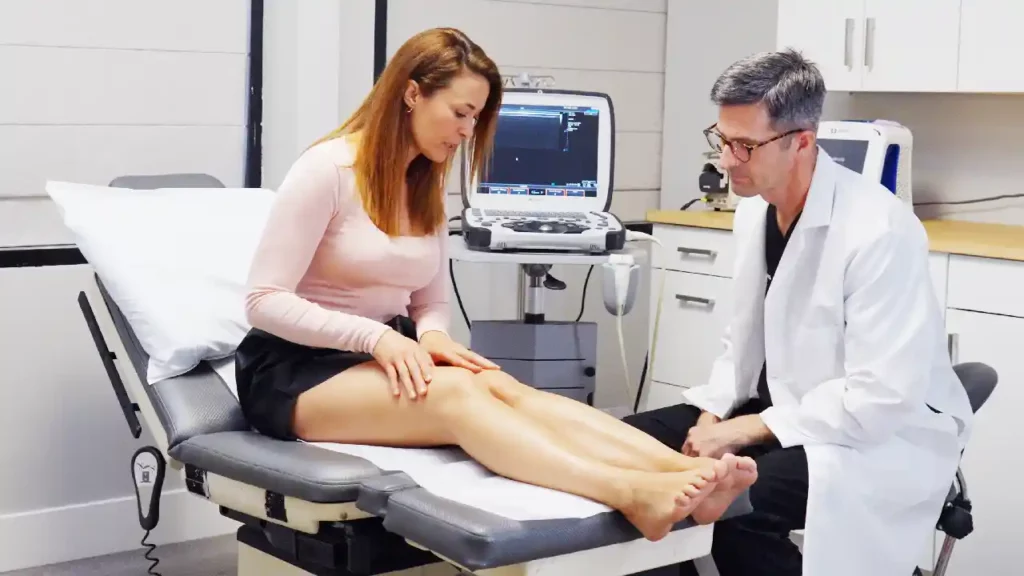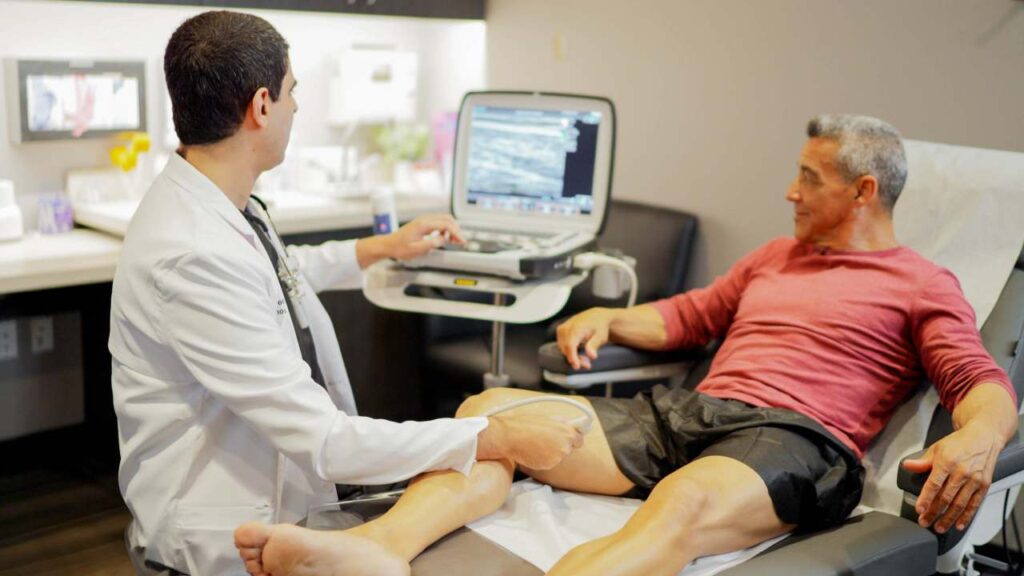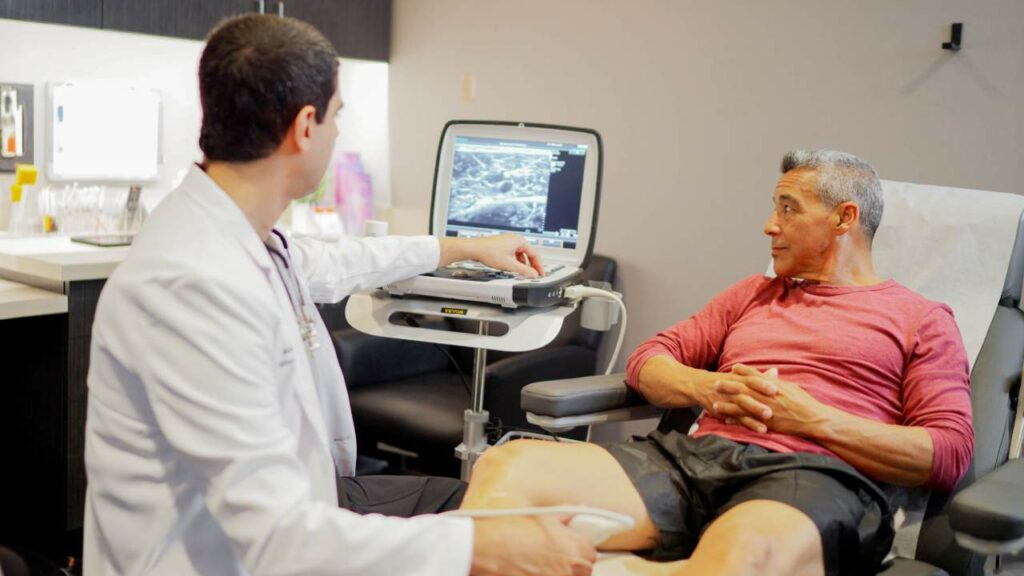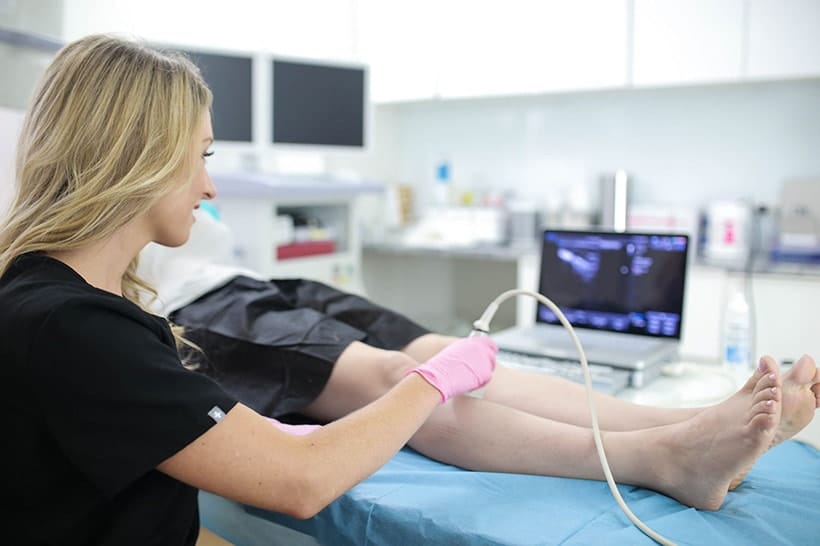What Is an Ablation Procedure?
Ablation is a technique that closes a faulty vein so blood can no longer flow through it. This prompts blood to change course and flow into healthy veins that are able to transport it back to the heart. Ablation procedures can address varicose veins and spider veins, as well as broken valves deeper in the vein that allow blood to pool and create those visible veins at the surface.
Vein ablation prevents unnecessary phlebectomy, in which varicose veins are surgically extracted from the body. Minimally invasive vein ablation is performed in various ways, utilizing either sclerosants, radiofrequency, lasers, vein adhesives, or rotating catheters. Both the procedure and the recovery are quick. Read on to learn what to expect, or click HERE to schedule a vein ablation consultation at our renowned vein center in California.
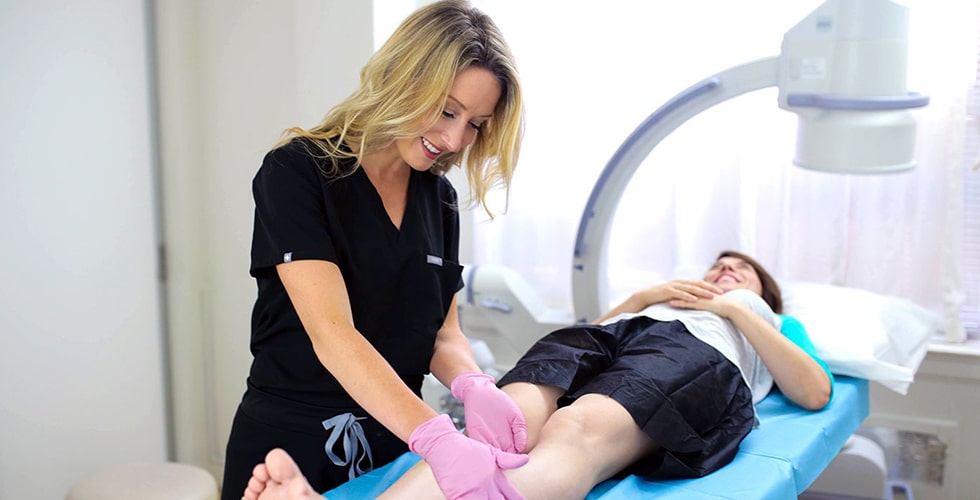
What Are the Treatment Options for Vein Ablation?
There are several treatment options for minimally invasive vein ablation. All of the procedures are performed in-office without general anesthesia. Ablation procedures that use thermal energy (radiofrequency ablation and endovenous ablation) utilize a locally injected anesthetic to protect surrounding tissue from heat. Other modalities don’t even require local anesthesia. The best treatment option for you depends on your symptoms, medical history, preferences, and the severity of your vein damage. Here are some common modalities used by our Harvard-trained vein doctors in California.
- Sclerotherapy– Doctors inject a liquid, foam, or pre-mixed foam sclerosant into the vein to irritate it, prompting it to close. This is used most often for spider veins and smaller varicose veins and requires no local anesthesia. This method is offered under brand names like Varithena or Asclera.
- Radiofrequency Ablation (RFA)– This ablation procedure uses heat to close the vein, so it involves an injection of tumescent anesthesia around the vein prior to administering radiofrequency to the vein walls. It’s performed through a tiny incision and vein doctors typically use ultrasound guidance to guide treatment along the length of the vein. This vein treatment is often referred to as VNUS Closure or ClosureFAST, or the newest name, Venefit.
- Endovenous Laser Ablation (EVLA)– Similar to RFA, this technique uses heat to seal off a malfunctioning vein, but in this case, it’s derived from lasers. Our vein doctors typically favor RFA because EVLA is a bit less comfortable for patients because of the higher temperature of lasers. However, it’s safer and gentler than surgical procedures and widely used in certain vein centers. Names including VenaCure refer to EVLA.
- Mechanochemical Ablation– This is a dual approach to vein treatment in which a catheter rotates to damage the inner lining of the veins, and also secretes a sclerosant to irritate it, for treatment of complicated or larger veins. While it sounds intense, it’s actually quite gentle and the patient remains comfortable throughout the procedure. Look for this treatment under brand names like ClariVein.
How Long Do Ablation Treatments Take?
Most vein ablation treatments are done in well under an hour. Sclerotherapy often takes just 15 minutes, since there are no anesthetics involved. More complicated veins take closer to 30 minutes, and some patients will need more than one appointment if they have several damaged veins that stem from different broken valves. The vast majority of patients are in and out of our office within their lunch break and can head straight back to work.
What Is the Recovery Time for a Treated Vein?
Recovery time for a treated vein has improved dramatically since the days of routine vein surgery. Since our vein center uses minimally invasive tactics, our patients are able to resume their typical activities immediately after treatment. You’ll remain awake during the procedure and can stand up immediately and even drive yourself home. Mild symptoms like leg swelling, bruising, and slight discomfort are possible for some patients, depending on the extent of vein damage, but this resolves in a couple of days. Bruising might outlast the discomfort and persist for a week or two, but that is no cause for concern.
After Vein Treatment, Will I Wear Compression Stockings?
Some patients will wear compression stockings temporarily, if their vein treatment or medical history demands it. Compression stockings help reduce leg swelling and also enhance circulation to help prevent blood clots. Some patients feel more comfortable with compression stockings following an ablation procedure and those that do should have them fitted by their vein doctor for best results. But many patients will not need to wear compression stockings because of our cutting-edge vein treatment technology.
How Fast Can Patients Reduce Swelling After Vein Treatment?
Swelling after minimally invasive vein ablation is mild and brief, unlike with vein surgery. Some patients have no swelling, while others will have leg swelling for a day or two. If your procedure is likely to cause swelling, our vein doctors will recommend elevating your legs while at rest or wearing compression stockings, as well as avoiding sitting or standing for long periods of time without changing positions. Any steps you must take to reduce swelling are primarily for the first week or two.
How Long Do Treated Varicose Veins Stay Gone?
If varicose veins are ablated correctly, there is a very low recurrence rate since the vein is no longer able to fill with blood. Choosing a board certified vein doctor trained in ultrasound guidance is essential to ensure proper closure of the vein. While treated veins rarely reopen, it’s possible to develop new spider or varicose veins in the same area, if the underlying cause isn’t addressed. Make sure your vein specialist checks for broken valves or Chronic Venous Insufficiency before treatment, so you’ll have long-term relief.
How Long Does It Take to Recover from Vein Ablation in CA?
If you’re a California resident, you live near some of the best vein doctors in the nation. Our esteemed San Diego and San Jose vein specialists are Ivy League-trained, certified diplomates, and leading experts in the field of venous medicine. Our depth of experience and extensive training in the latest techniques enable us to offer the most efficient methods for treating veins. Our ultrasound imaging and state-of-the-art tools make treatment quick, gentle, and effective. You won’t experience a faster recovery at any other vein center in California!
